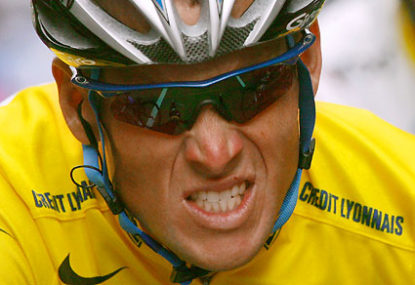'I've just won a stage of the Tour de France, mate!': Hindley grabs yellow jersey as Aussie blows Tour apart
Australia's Jai Hindley has said he is "lost for words" after a shock stage victory at the Tour de France earned him the leader's…

It was Lance Armstrong’s inspiring cancer-survival story that lifted cycling’s profile to a more mainstream level of appeal.
Now the unraveling of the truth behind that story threatens to bring down the sport he ruled.
The evidence of doping is now overwhelming. For anyone who still proclaims Armstrong’s innocence, read the 200-plus pages of the USADA report or Tyler Hamilton’s The Secret Race tell-all book that details the systematic doping methods during Armstrong’s reign. It’s the game-changer that unveils the truth.
Even Armstrong’s staunchest supporters have described the new evidence as overwhelming. And while he continues to proclaim his innocence, Armstrong must know deep down that this is the endgame.
What’s now clear is the depth of the doping in this era. According to Hamilton, at least 80 percent of the peleton was doping. Australian Matt White, who has stepped down as team director of Orica-GreenEDGE, is just one of many implicated in the USADA report with more sure to follow his path in admitting the truth.
So where does this leave the governing body, the International Cycling Union (UCI)? President Pat McQuaid insists the sport has “moved on” but has suffered “big damage” from the Armstrong saga.
But where does it sit in all this? How did Armstrong and his cohorts avoid penalty till now, following on from an independent examination from an outside party? Even if it wasn’t involved in the alleged doping, surely the UCI is guilty of failing in its role as governing body to ensure such cheating is punished.
Former WADA president Richard Pound says: “It is not credible that they didn’t know this was going on. I had been complaining to UCI for years. Where the rubber really hits the road is with UCI.”
And how convenient, when you consider the Festina drug scandal at the 1998 Tour de France exposed the doping culture in the sport that immediately preceded Armstrong’s reign.
As cycling journalist David Walsh, one of the earliest doubters over Armstrong’s legitimacy, says, “Cycling had just come out of maybe its worst year for doping – the 1998 Tour was shown up by French police to be a drug-riddled circus.
“Then Armstrong came along and you had to make a decision: Was this part of the rejuvenation of cycling or was this a continuation of the doping culture?”
How did we believe that a clean rider could win seven Tour de France titles in an era when doping was so prevalent?
Moving forward, when the governing body, riders, race and team directors, general managers, media and so many in the sport were seemingly part of the omertà (code of silence) that existed in professional cycling, then how can the sport cleanse itself and convince us that it’s moved on to a cleaner era?
Should White, for example, be pardoned for simply following the leader and the wider pack into doping or cast out of the sport for giving in? If it’s the latter then a hell of a lot of people at all levels of the sport must follow suit, leaving the world of cycling short of masses of participants and personnel.
But, in saying that, the cleansing process must surely set a strong precedent to try and somehow discourage doping from the sport once and for all.
As Hamilton says, “If we don’t figure out what happened in the past, how it happened, why it happened and how we can prevent it from happening in the future, how do we know it’s not going to happen again in two or three more years?”
This cleansing process comes at a time when the sport will undoubtedly suffer a backlash from sponsors eager to distance themselves from the anger of the fans, on top of relying so heavily on a European economy still bleeding from recession.
With a good chunk of the supporters Armstrong introduced to the sport likely to turn their backs and watch something else, having rightly felt cheated by the sport, cycling has a tough ask to try and win them back considering so much of the recent history of the sport is now blanked out.
Hopefully Armstrong can see the damage this has done to the sport he supposedly loves and finally admit the truth. An admission from the Texan will help the healing process and close the chapter on the drug-filled era in the sport.
But Armstrong’s greatest defense is his title as cancer survivor. As SBS Cycling Central’s Philip Gomes says, “Is supporting Armstrong even sustainable after those new to the sport read for the first time about the thuggery extended to those who crossed him? It appears so. Why? Cancer.
“Cancer is Lance’s shield. He beat it and evangelises about it and has amassed a fortune and acolytes because of it. It is the source of his strength and what support he has left.”
In this immensely complex saga, perhaps the most difficult aspect to grasp is the fact that Armstrong, doping-assisted or not, still beat cancer and returned to compete at the highest level of cycling, for which he is lauded as a hero by many. No one can take the title of cancer-survivor away from him.